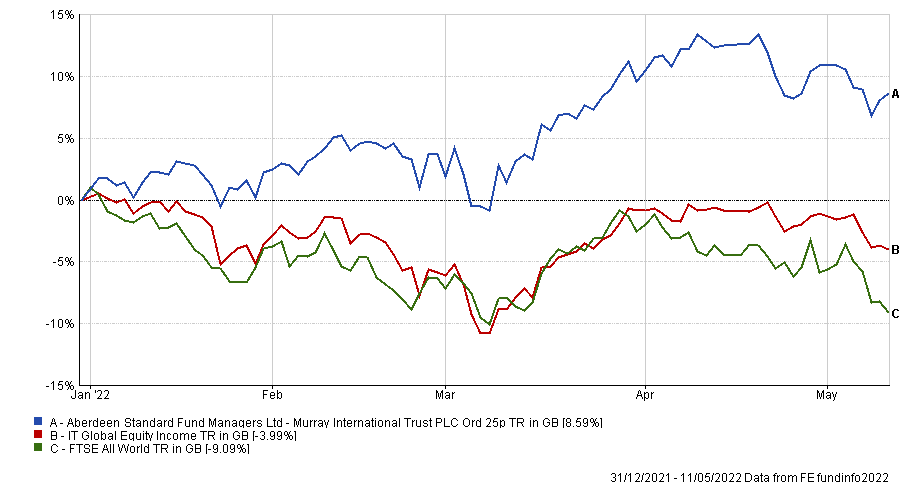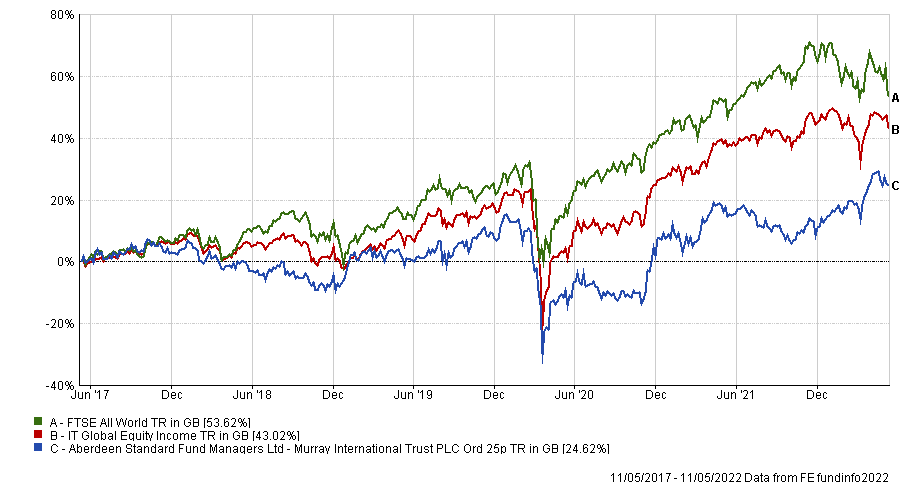Investing for income has been a rollercoaster ride over the past few years as the pandemic caused many companies to conserve cash at the expense of distributing it to shareholders.
But with the world now reopening and rising inflation boosting the returns of many commodities companies, global income strategies have come into their own.
One such beneficiary is Murray International. The trust has been the best performer in the IT Global Equity Income sector so far this year, returning 8.6% while its average peer and FTSE All World benchmark index have lost money.
Total return of trust vs sector and benchmark year-to-date

Source: FE Analytics
However, it has not all been smooth sailing. The trust suffered in 2021, making the second-lowest returns in the sector, while in 2020 it lost 5.3% at a time when the market gained 12.4% and its peers were up 5.3%.
Below, its manager Bruce Stout explains why relative performance is destroying the fund management industry, how stocks are like 16-year-old wannabe footballers and why picking a favourite company is like choosing between favourite children.
What is your process for picking stocks?
We are bottom-up stockpickers who maintain a fully diversified portfolio at the geographical, sector and company level. We focus on quality and above-average dividend growth.
We have a limit of 5% in each holding so that we don’t end up becoming hugely exposed to one company. But we are also high-conviction because we don’t have more than 50 stocks, so we want to know our businesses well.
Why should investors pick your fund?
You must make sure that the shareholder understands what they are buying. We are a global income trust that tries to grow our dividend above the rate of the retail price index (RPI), which we have done for 15 of the past 17 years.
If you want income and long-term capital growth, then you might be interested in this trust. If you want what is in fashion, or capital growth only, then this is not for you.
What have been your best and worst recent stock picks?
Our best performer in recent times has been Soquimich, a Chilean potash and lithium producer that has benefited from two things: one is the relentless rise in the lithium price as electric auto manufacturers try to tie up long-term supplies; the other is the collapse in the potash market due to the sanctions imposed on Belarus as well as Russian firm Uralkali, withdrawing its capacity from the global market. Over the past year and a half, it has more than doubled.
On the worst side, Taiwan Semiconductor has been impacted by the compression of multiples in the US tech market, even though its underlying business is extremely strong on volumes and pricing.
It is a short-term valuation issue but that has had an impact as it is one of our most significant holdings – it is in the top three. It has struggled for six months. [The shares are down around 15% in that time].
What is the most exciting stock in the portfolio?
It’s a bit like saying who is your favourite child. If there wasn’t upside in a business, then we wouldn’t own it and I don’t rank them because they will all take different times to mature or deliver. Some won’t make it for various reasons, whether it be industry or macroeconomic dynamics.
So we are looking for companies within an industry that we think have got fantastic potential, but until they deliver, that is all it is.
It’s just like a football player. The world is full of 16-year-olds with fantastic potential, but they never make it as professionals. Sometimes the ones that really excel are the ones that grind it out and find themselves in a massively profitable situation.
An example is Grupo Aeroportuario, which we have owned for 20 years and is now our largest holding. It is a Mexican airport operator and a real asset. It has dominated Cancun and Cozumel and has been able to grow the airports’ traffic and commercial revenues.
With no debt and basically a monopoly on passengers coming in and out of those holiday destinations, every year it bounces back stronger and generates cash and dividends.
If we could have 20 of these, that would be terrific, but it is impossible to look forward and say this is the one that excites me the most.
How does gearing on the trust work?
The rationale is simple: is it in the investors’ interests to have gearing in an investment trust? The answer is, how much does it cost? If you pay 6% for the gearing, then you can’t make money off that unless you get a bull market and get it right.
But you can make money on anything less than 3% gearing, because even if you don’t get the timing right, you can get the yield from the stocks of 4 to 5%.
Our recent tranche of £60m cost us 2.8% for 15 years locked in, so we think we can make money from that.
You also have to ask: what are you going to put it in? You don’t just take it out and stick it in the equity market. You need the flexibility to put it into the best relative attractive opportunity that is there, which might be bonds.
In the past 20 years we have twice had large bond weightings because they were better opportunities than equities. One was in 2007 when we had 28% in bonds and the other was in 2016 when we had 16% in emerging market bonds. Today that is at 8%, so we have sold down and moved money into equities as they have fallen.
Do you use environmental, social and governance (ESG) principles?
ESG is very important to us and has been for my whole life in investment management. It has become a topic now, but if you go back 30 years, the main reason we were interested in it was the G. If you don’t get governance right when investing in markets, then you can lose an awful lot of money.
We then expanded it to the E and the S and we thoroughly screen every company we buy.
Total return of trust vs sector and benchmark over 5yrs

Source: FE Analytics
Recent performance has been choppy. Why is that?
The real question is: what are the key performance indicators for Murray International? In the past 20 years they haven’t changed: grow the dividend above RPI, have an above-average dividend yield covered by income, and grow the net asset value over the rate of inflation over the long term.
Relative performance is destroying our industry. If you are an income investor and buy Murray International, if we have no dividend growth and inflation is 2 to 3% that year, but we are down 10% and the market is down 20%, that is no good to you. Relative performance does not pay the gas bill.
There is no point comparing a trust like ours, which can own bonds and invest in any market in the world, against others that are buying the hot stocks and paying dividends out of capital.
What do you do outside of fund management?
Football and music are my passions. I support Dundee United.





